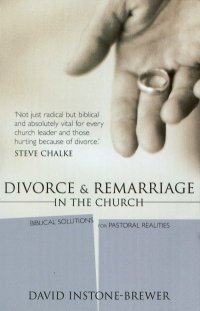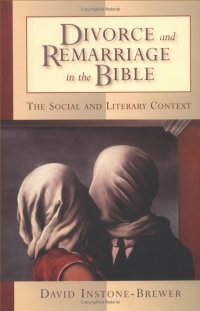

|
Reviews
Divorce and Remarriage | ||

|
Revd Dr Burridge The Church Times 1/17/03 (UK) |

|
| Full review: | ||
|
DAVID INSTONE-BREWER is a Baptist minister and research fellow at Tyndale House, Cambridge. He interprets the New Testament teach-ing on divorce and remarriage with a pastoral concern for those facing marriage breakdown today —- some-thing that is greatly needed, espe-cially after the General Synod's recent decision. He argues that the Old Testament allows for divorce on "valid grounds" such as adultery, abuse and neglect. Both Jesus and Paul con-demned divorce (and remarriage) without such "valid grounds"; they discouraged divorce even when there were valid grounds, but allowed for remarriage here. He demonstrates that the majority of interpretations, throughout the history of the Church, have not agreed. Also, Jesus's total rejection of divorce in Mark 10.1-12 appar-ently undermines his case. In re-sponse, he rightly .argues that scrip-ture must be understood in its plain sense within its original historical context — and he tries to reconstruct this for key texts in the Gospels and in Paul. After a detailed treatment of marriage in the ancient Near East, hi the Old Testament, intertestamental sources (including the Dead Sea Scrolls) and rabbinic material, he argues that first-century Shammaite courts permitted divorce (and remarriage) only on biblical grounds of adultery or neglect; while Hillelite courts interpreted Deuter-onomy 24.1 to allow for "any matter". Jesus's teaching in Mark 10 and Matthew 19, interpreted in the light of this debate, agrees with Shammai, declaring Hillel's "any matter" divorces invalid. Mark's total condemnation of divorce "makes no sense" in its first-century context: it is an abbreviated account, using rabbinic methods also found in the Dead Sea Scrolls; and any first-century Jew would have realised it was "obvious" that bib-lical exceptions accepted by Sham-mai should be included, as in Matthew 19. Paul also distinguishes valid and invalid divorces in 1 Corinthians 7 —- and thus Instone-Brewer harmon-ises Paul and Matthew with the historical Jesus, alongside Shammai and the Old Testament, permitting divorce and remarriage on valid grounds. Instone-Brewer's tour de force relies heavily on his earlier work on rabbinic and Dead Sea material (he cites himself more than anyone else), which has been criticised for assuming that the Hillel-Shammai debate was like later rabbinic courts. He recognises that such material is much later — but still suggests that the Gospel accounts have a legal setting. Thus "Jesus ruled that lust was equivalent to adultery," he says, while most scholars interpret Mat-thew 5.28 as hyperbole (like the fol-lowing verses about plucking out eyes and cutting off hands). Instone-Brewer wants to apply the "rules of scripture", yet he criticises others for being legalistic. Although he concludes that Jesus and Paul allow divorce and re-marriage on only "valid grounds", when it comes to pastoral practice, he will remarry everyone because the minister cannot judge who is guilty. So, if you want to interpret Jesus and Paul as legislating for us today, and yet be pastorally con-cerned for divorce and remarriage, this is probably as good an argu-ment as any other. However, I would argue that the Gospels do not con-tain "rules", nor was Jesus legis-lating in a "court". His rigorous teaching on marriage challenges us with the high ideals of God, as does his other material on "giving every-thing away" or "turning the other cheek". Meanwhile, greater attention to the biographical character of the Gospels also demonstrates Jesus's pastoral acceptance of "sinners" who fail to live up to those ideals. General Synod's recent decision both to affirm the sanctity of life-long marriage and to accept divorce and remarriage seems better to re-flect both biblical teaching and Jesus's gracious welcome to us all. The Revd Dr Burridge is Dean of King's College, London.
|
||
| Read more reviews... | ||
Version
-for ministers
-for academics
-for everyone
Summary
Questions/
Comments
& Replies